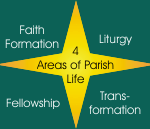

 |
|
 |
|
Homily for June 5th, 2005.
Caution: Putting a Sunday homily on the Website is tricky business. All the viewer has is a written text. A homily, on the other hand, is "an oral event". It may not have been said or heard the way it was written. In addition, a roughly ten-minute homily is part of a roughly one-hour worship event in which God and God's people communicate with each other by means of ritual, symbol, song, proclamation, prayer. Not everything in these homilies is original. As a homilist, I rely on and at times borrow from other homilists and writers who are not properly mentioned in this format. I am often indebted to them. Father William Marrevee, s.c.j.
10th Sunday Ordinary Time A Have you ever noticed how, in the Scriptures and in the Church’s prayers inspired by the Scriptures, God is so often described, spoken of and prayed to as the Merciful One? Those who are more familiar with biblical languages than I am always insist that the Hebrew word for that is chesed. It is difficult to translate, but it means something like loving-kindness, mercy, steadfast love, loyalty, faithfulness, grace. It inspires, motivates, permeates God’s reaching out to us human beings with grace, with love. It is the source of God’s initiating, making Covenant with us. God knows himself "more complete" with us sharing in his life. That sort of reaching out to us has taken on the shape of Jesus; more specifically, it takes on the form of Jesus calling Matthew as in today’s Gospel. Matthew is one of those people that properly religious people should have nothing to do with. Properly religious people should not mix with the likes of Matthew, that “bunch of sinners and tax collectors.” That is why today’s brief Gospel passage is not just an isolated, harmful incident. In its own way it sums up who Jesus is, what his mission is. It is also the sort of incident that will soon lead him to being crucified. No wonder that the way Jesus deals with Matthew unsettles the Pharisees. In fact, they are scandalized, they resent it. “Why does your teacher eat with sinners and tax collectors?” He should know better, if he is from God. “Eating with…” means more than giving someone something to eat. It means fellowship, communion with…. So the incident is a good example of how Jesus got under the skin of the Pharisees and vice versa. But Jesus stands his ground. “What do you want me to do? That is what I am all about. I have come to call not the righteous but sinners.” It is a sharp rebuttal of the self-styled righteousness of the Pharisees. But it is also an exciting piece of Good News. What is on display here is how Jesus enacts and embodies God’s chesed, God’s mercy by associating with religious outcasts such as Matthew. In the process, he challenges the conception of the righteous on who is the “insider” and who is the “outsider”. It is good for us to keep that in mind as we have gathered to sit at God’s table. There always seem to be some people who know so well who should not be at this table of God. We should be very clear that nobody deserves to be here, but we all need to be here, because God loves us to be here; we are all graced by God’s chesed. I suggest that with this sort of Gospel passage we go one step further. If God’s dealings with us are so full of mercy, ought that not to rub off on us in our dealings with others, with those who may have wronged us in some way…? There is that challenging word of Jesus: “Be as merciful as your heavenly Father is merciful.” We would not want to let God’s chesed go wasted on us. After all, part of that saying of Jesus in today’s Gospel “I have come to call not the righteous but sinners” is “Go and learn what this means “I desire mercy, not sacrifice.” |
|||||
| © Copyright 2025 Our Lady of Victory / St-Malachy Site
490 Charles Street • Gatineau • Quebec • J8L 2K5 Telephone: (819) 986-3763 Website powered by Arvixe Web Hosting |